Every cat is different, so what works for one may not work for another. Some cats will use the litter box with no problem, but others may prove more difficult. There are many different litters out there that claim to be the best for this specific type of cat, but which one is right for you and your kitty?
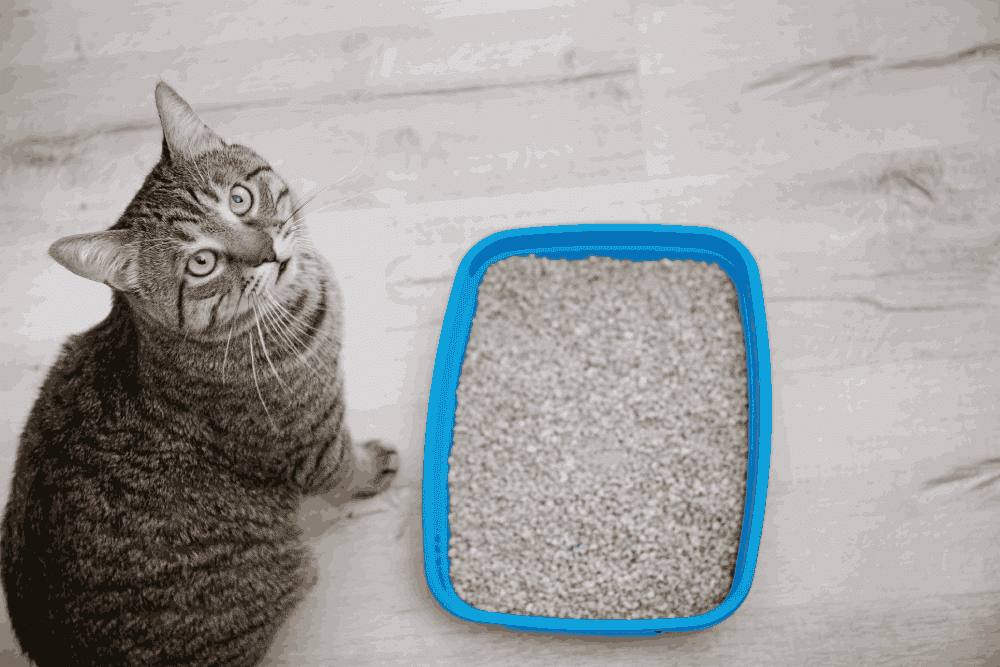
Source: google.com
What Causes Cats To Pee Outside The Litter Box?
Before addressing a litter box issue, you must first understand why your cat is peeing inappropriately. A cat will urinate outside of its litterbox for one of two reasons: a medical problem or a behavioural problem.
Medical Issues
The first step if your cat is peeing inappropriately is to see your veterinarian. The vet will examine your cat and examine a urine sample. Your veterinarian will make a treatment recommendation based on the results. There are several common urinary medical problems in cats:
Bladder stones: Some cats develop bladder stones, which can cause irritation and blockage. Crystals may be seen alongside bladder stones or as a prelude to stone development. If your veterinarian suspects bladder stones, X-rays will be required to determine the size and number of stones. Smaller bladder stones may dissolve with a particular diet, but larger stones may require surgical removal (cystotomy). A urinary tract infection (UTI) is common in cats with bladder stones. If this is the case, antibiotic treatment is required.
Idiopathic cystitis: Cystitis refers to bladder inflammation. The term idiopathic refers to a condition in which the cause is unknown. Cats with cystitis frequently develop hematuria (blood in the urine). Urine testing is critical since blood can only be spotted microscopically. The most likely diagnosis is idiopathic cystitis if your veterinarian finds blood in your cat’s urine but no crystals, germs, or stones. Idiopathic cystitis is typically treated with a mix of dietary and environmental changes. Medication for pain and anti-anxiety may also be used.
Increased urination is one of the symptoms of chronic renal disease. Other metabolic conditions that may cause your cat to urinate are liver disease, diabetes, and thyroid problems. If your cat has been drinking more or you have been cleaning the litterbox more frequently, your veterinarian may want to do some blood work to rule out these conditions.
Urinary tract infection (UTI): While urinary tract infections are uncommon in young cats, they can be a prevalent cause of urinary problems in older cats alone or in conjunction with other medical diseases affecting the urinary system. Urine bacteria can produce an inflammatory response in the urinary tract. A urinary tract infection is treated with antibiotics. Following the completion of the antibiotics, your veterinarian will most likely recommend additional testing to ensure that the infection has been eradicated.
When one or more urine problems become chronic, the disorder is known as feline lower urinary tract disease or FLUTD. If your cat has FLUTD, your veterinarian may offer a special urinary diet and vitamins to help the urinary system. Urinary issues might result in significant urinary obstruction, particularly in male cats. If your cat is having urinary problems, don’t put off going to the clinic. If your cat is urinating, but no pee is coming out, it may have a blockage or partial obstruction. In this instance, take your cat to the clinic as soon as possible because this condition can swiftly become life-threatening.
Occasionally, improper urination happens while a cat suffers from a nonurinary health issue.
Your cat may be peeing outside the box due to pain or discomfort somewhere else in the body. If no health issues are discovered during the initial exam or urinalysis, having your veterinarian request extensive lab work to look for them is a good idea. Lab work can uncover significant health issues such as diabetes or kidney disease, allowing your veterinarian to begin treatment immediately.
Behavioural Motives
If no medical cause for your cats improper urinating is detected, it’s critical to determine what elements are causing your cat to behave in this manner.
A filthy litter box: Cats are fussy about where they relieve themselves. Your cat may be too dirty for the litter box. It could also be spotless but inconvenient to use. The box, for example, may be too small for your cat to use comfortably. It could also be at a location that your cat dislikes5. This may irritate your cat if it is covered. Perhaps the litter has a strong odour or a bothersome feel on your cat’s paws. Cats need variety, so having too few litter boxes might be an issue.
Stress: Your cat may be attempting to communicate that it is stressed at home.5 It may be dissatisfied with another animal in the household and is marking its territory to communicate with the other animal. If the other animal is around, your cat may decide it’s too dangerous to use the litter box. If a new person is in the house, your cat may “act out.”
Cats are susceptible to even the slightest changes in their surroundings. Whatever the source of the stress, ensure your cat has a peaceful spot to escape. This haven of refuge should not be accessible to new animals or humans.
Smells of old urine: When your cat urinates in a concentrated area, the odorous ammonia smell may linger long after. A cat’s sense of smell is far superior to yours. If past pee odours persist in your home because you aren’t changing out the litter frequently enough, your cat will refuse to use the litter box in protest, because it is dirty to them. They want to use a clean area for peeing, so ensure that you’re cleaning the litter box and changing out the used litter frequently – this can be at least a couple of times a day depending on the amount of waste produced by the cat.
It is also worth noting that due to cats’ heightened sense of smell if they are refusing to use the litter box and use another area within the home to urinate, they will likely return to the area because of the stink.
5 Litter Options For Cats Who Pee Outside The Box
1. Original Unscented Cat Litter from the World’s Best Cat Litter (Best Overall Litter)
So, what makes this a decent option for cats who dislike their litter? To begin with, this litter is 99% dust-free and contains no artificial smells. We’re off to a good start with these two must-have litters for cats who urinate outside the box. These two characteristics combine to make it one of the best hypoallergenic cat litter. It is an excellent cat litter for cats suffering from asthma or allergies.
This litter also has excellent odour control. It quickly absorbs all pee before foul ammonia odours may escape into the air. This is clumping litter, so cleaning the litter pan is simple. Sweep out any pee clumps each day, and the litter box will retain its fresh smell for weeks, something you and your cat will love.
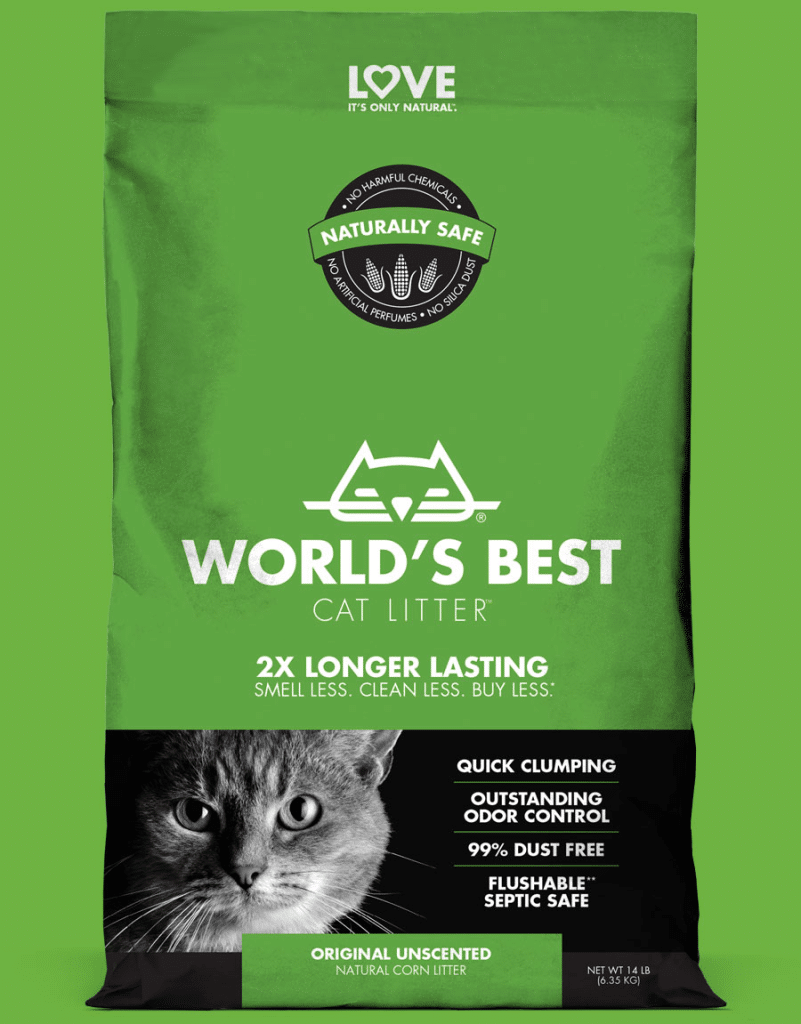
Source: google.com
This litter is made from corn kernels as well. Because this is a relatively uncommon litter substrate, cats may initially find the texture weird. However, it is soft and comfy on its paws, so the transition should be easy. Furthermore, this litter will not adhere to your cat’s paws. This not only helps fussy cats but also lowers litter tracking.
The choice of maise kernels is also beneficial to the environment. The litter is completely biodegradable! This also means that the litter is flushable, making cleanup a breeze. Furthermore, a bag of this stuff lasts twice as long as typical litter, saving you time and money on cleaning.
2. Tidy Cats Clumping Litter Purina (Best Clay Clumping Litter)
Although not as environmentally friendly, clay-clumping litters are suitable for cats who pee outside the litter box. This is because clay litter is widespread, and most cats enjoy the texture of clay. Clay also resembles the sand and mud cats would use in the wild to bury their excrement.
Purina Tidy Cats clumping cat litter is my favourite of all the clay clumping litters for fussy cats. This hypoallergenic clay litter is 99.9% dust-free and contains no artificial smells. This makes it ideal for cats and people with allergies and eliminates the possibility of your cat rejecting this litter.
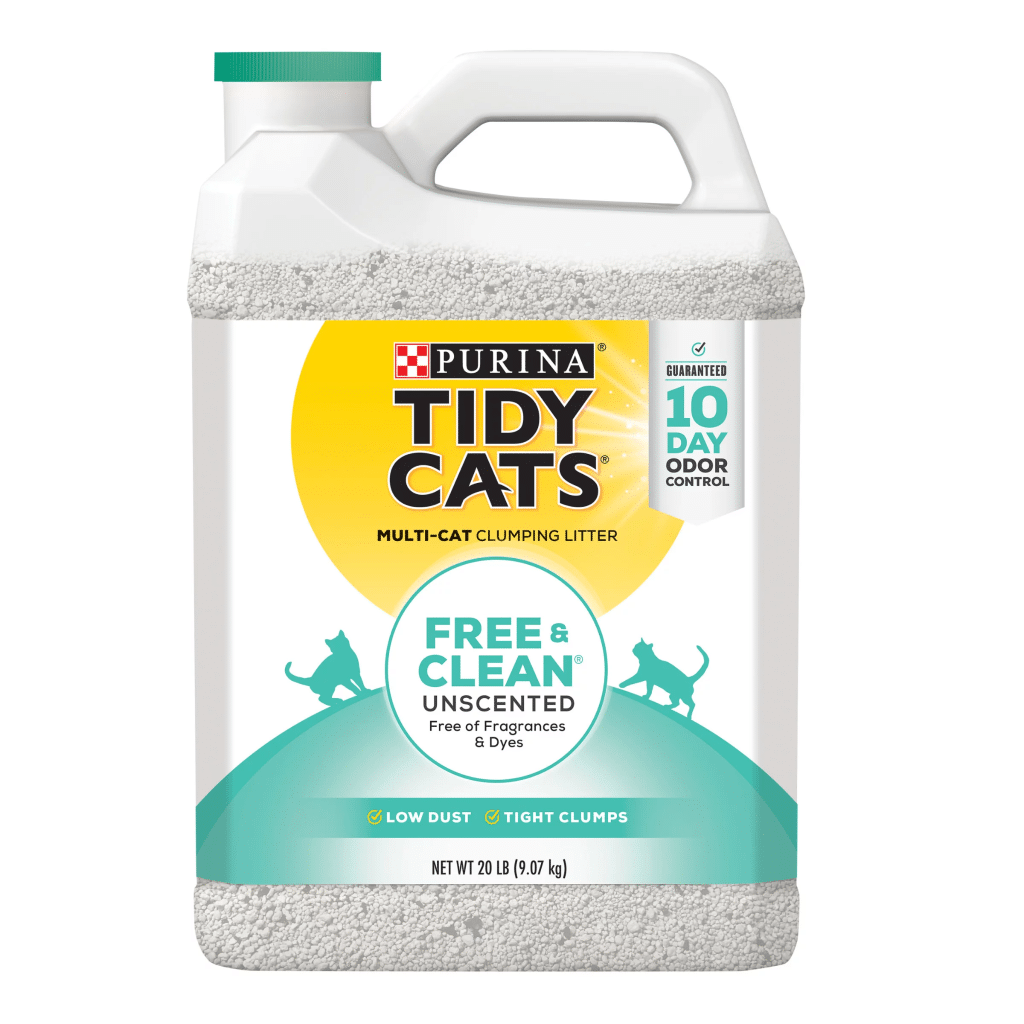
Source: google.com
This litter is made with medium-grain clay. This is smooth and soothing on your cat’s paws and immediately produces hard clumps. All ammonia odours are virtually quickly eradicated by this method, ensuring that the litter box remains fresh and clean. The clumps that form are also substantial, making scooping and disposal simple.
Purina cat litter is ideal for single or multi-cat households due to its exceptional odour control. If you want to take things a step further, Purina now provides a 4-in-1 Strength Cat Litter. However, these items have some tracks, which isn’t good for you or your cat.
3. OKOCAT Super Soft Clumping Natural Wood Litter (Best Wood Cat Litter)
Because of its eco-friendliness and sustainability, wood is becoming a preferred base for cat litter. However, many individuals discover that their cats dislike wood pellet cat litter. The pellets are frequently rough and unpleasant to step on. Wood fibre cat litter, such as the OKOCAT Natural Wood Super Soft Clumping Litter, offers a solution.
Because this cat litter is still comprised of wood, it has the same environmental benefits as wood pellet cat litter. However, rather than giant pellets, this litter has a texture comparable to clay litter. This is a significant benefit because most cats enjoy the feel of clay litter on their paws. Furthermore, this super-soft variant is designed exclusively for cats with delicate paws.
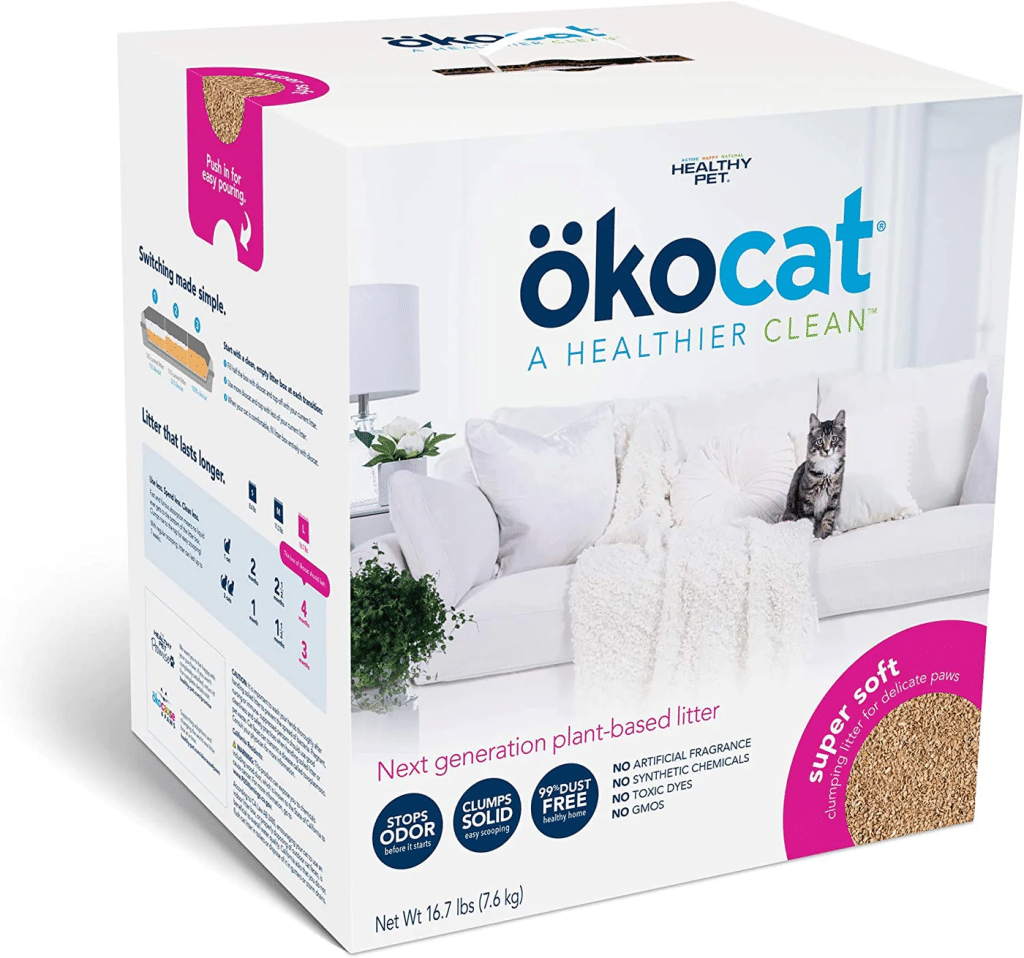
Source: google.com
When your cat pees on this litter, the wood fibres halt the enzymes that cause ammonia odours dead in their tracks. This efficient odour control can mean the difference between your cat utilising or not using its litter tray. The wood fibres form easy-to-scoop clumps during the process, making cleanup quick and straightforward.
Furthermore, this is a dust-free composition made entirely of screened and de-dusted wood. There are no artificial fragrances, either. However, some cats may not enjoy the faint wood scent – cats have extremely sensitive noses, and some will prefer the scent more than others. This is something you’ll have to figure out for yourself.
4. Frisco Unscented Clay Clumping Litter for Multiple Cats (Best for Multi-Cat Households)
If you have more than one cat, I recommend the Frisco Multi-Cat Unscented Clay Clumping Litter. This litter has outstanding odour control that is so strong that it may mask ammonia odours from multiple cats. It tries to neutralise odours rather than hiding them with artificial and overbearing perfumes.
This litter is also dust-free, which is beneficial to cats with allergies and healthy for your lungs. Furthermore, as a low-tracking and low-dust litter, there will be minimum mess around your home regardless of how many cats come and leave. However, because the granules are so minute, they may become entangled in the fur of longhaired breeds.
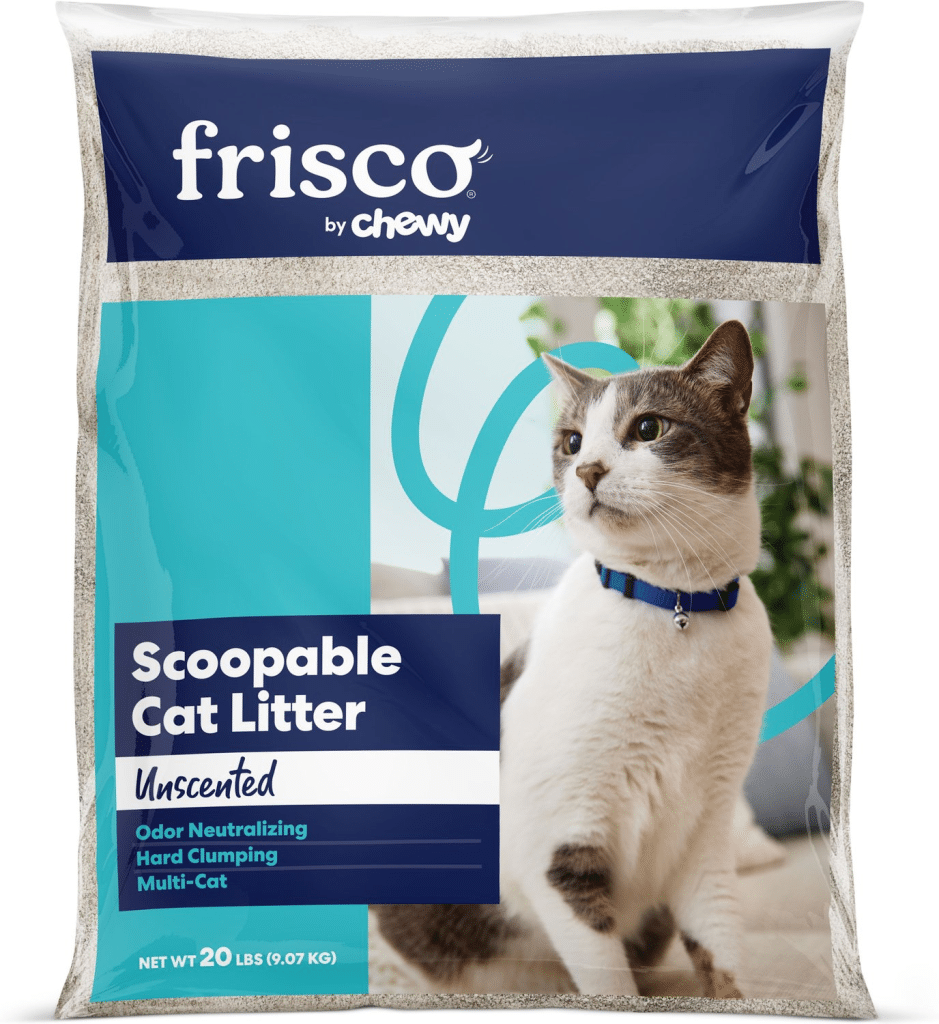
Source: google.com
Nonetheless, because these refined clay grains are a natural litter substrate for cats, most will not be bothered by the texture. They’re super soft and delicate on your cat’s paws, making them ideal for cats with injuries or sensitive skin.
This is a clumping litter as well. When you try to scoop away the waste, the clumps that form are stiff and will not break apart. This makes the cleaning process a little bit easier. However, clay is not the most environmentally friendly material, and trash must be disposed of.
5. Naturally Fresh Walnut Cat Litter (Best Non-Clumping Cat Litter)
This is a walnut shell-based pellet litter. If your cat is used to more gritty or clay-based litter, this will feel weird on its paws at first. Make sure to introduce the pellet litter gradually so your cat adjusts well to the change. However, the texture is rather pleasant once they get used to it. The pellets are smooth and shouldn’t bother healthy cats too much.
This litter is mainly beneficial for picky cats because of its excellent odour control. It absorbs up to seven times the amount of ammonia odours as other top non-clumping litters. Walnut shells are more absorbent than both pinewood and wheat, and they are also a more environmentally responsible option. It also lacks the natural woody odour that some cats dislike.
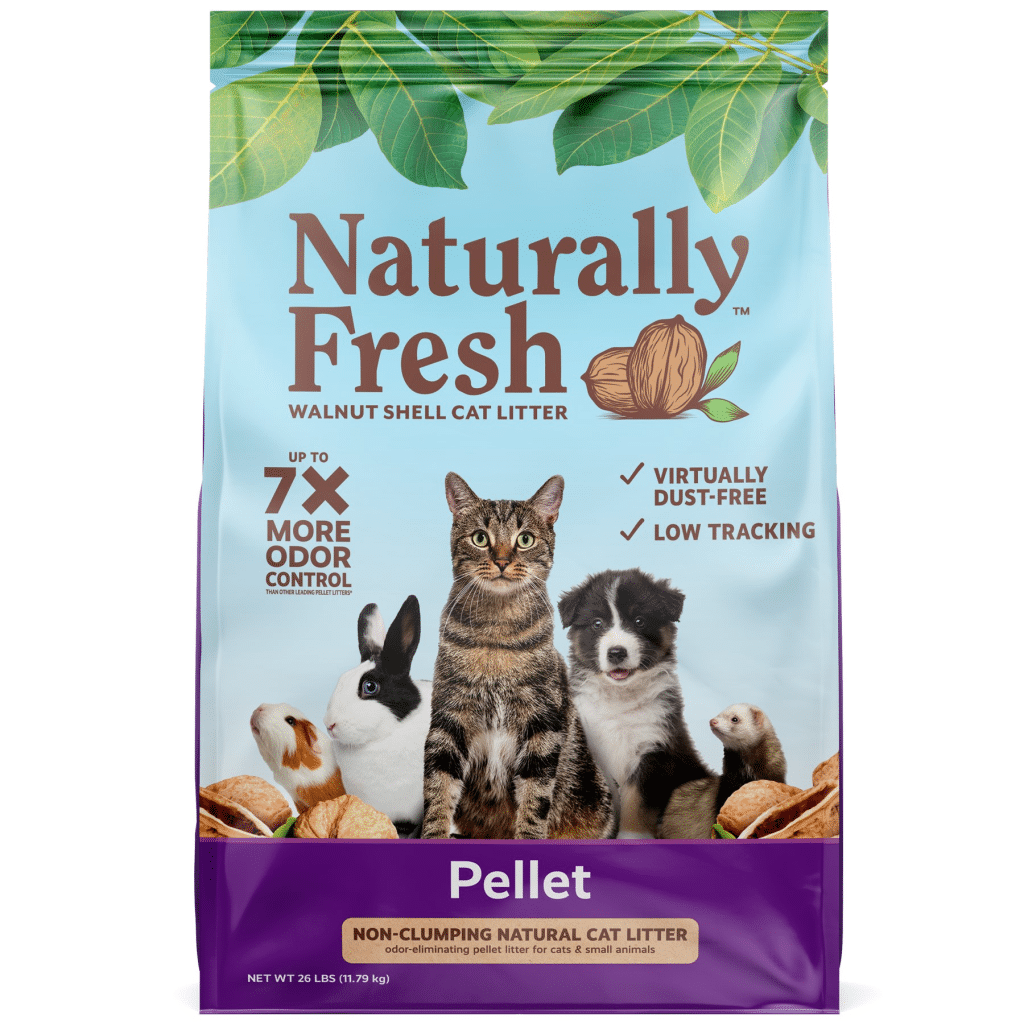
Source: google.com
Because it is almost dust-free, this litter is ideal for cats who pee outside the box. The big pellets will also not adhere to your cat’s paws. This is fantastic for comfort while also keeping litter tracking to a minimum. The non-clumping, on the other hand, can make cleaning more difficult. If that’s a big deal for you, try their Clumping Walnut Cat Litter instead.
Here Are Some Suggestions For How To Stop Your Cat From Peeing Outside The Litter Box.
More litter boxes should be provided.
If you’ve concluded that your cat is urinating inappropriately rather than spraying, it’s essential to scrutinise your litter box.
First and foremost, how many do you have? One litter box is frequently insufficient. The typical guideline is one box per cat, plus one extra.
Cats can be picky about using a box with urine or excrement, especially if it is not their own. The more litter boxes you have, the more likely your cat will locate one suitable for its needs. If you are not in a position to be able to change out your cat’s litter box frequently, having more than can alleviate the issue!
Choose the Correct Litter Box
Enclosed litter boxes may look great in your home and help to keep the mess and odour at bay, but your cat may disagree. Enclosed boxes can be narrow, dark, stinky, and challenging to turn around, in-not ideal conditions for cats to relieve themselves.
You should also ensure that the sides of your litter boxes are low enough for your cat to step over, especially as they age comfortably.
The ideal litter box is spacious and open, with low sides or at least one low location into which cats can readily enter.
Reduce Your Cat’s Anxiety
Cats are routine creatures. Anything out of the ordinary causes stresses and affects the urinary tract: kidneys, bladder, urethra, and so on.
Many things that people may not consider scary can create anxiety in cats. For example, when we decide to take a trip, we anticipate it. Your cats may notice your luggage as something different in their environment and may even associate it with you leaving the house.
It may cause significant stress, resulting in improper urination on, in, or near the luggage. New visitors, house parties, packing and relocating, new furniture, or changes in the house layout can all trigger the same stress response.
Loud noises from dryers, pipes or even fireworks on holidays will drive cats away from their litter boxes, mainly if they occur when they are using or near the box.
The most excellent method to reduce stress is to keep many easily accessible boxes around the house with clean litter in quiet, safe settings. If you must pack for a trip, consider moving your cat to where they cannot see the luggage or packing in a closed-off room.
To assist keep the surroundings as stress-free as possible, employ feline calming aids such as specially-made cat calming treats or cat pheromone diffusers. Taking your cat in for a checkup and consulting with your veterinarian can also assist in identifying stressors, and drugs can be used to help relieve your cat’s anxiety in some circumstances.
Consult a Veterinary Specialist
The first important thing you can do if your cat has begun to pee outside the box is to schedule an appointment with your veterinarian.
Urinary tract infection, hyperthyroidism, feline idiopathic cystitis (FIC), bladder crystals or stones, arthritis, diabetes, and kidney illness are all frequent health concerns that might cause cats to urinate outside of their litter box.
Your veterinarian will ask you questions regarding the problem and when it began, followed by a physical exam, urinalysis, and possibly another diagnostic test to see if the problem is medical rather than behavioural.
If your cat is given a clean bill of health, your veterinarian can assist you in addressing any environmental or behavioural issues at play.
Address Territorial Issues
Cats will sometimes spray to indicate their territory. Cats spray by standing in front of a vertical surface and squirting a small amount of urine. If you see a splash of urine on the wall, your cat is most likely spraying rather than peeing.
Male cats, in their entirety, are the most notorious sprayers. Cats should be neutered ideally before puberty, which occurs at 5 or 6 months. Your veterinarian can advise you when your kitten should be spayed or neutered.
Make your neutered cat feel more secure in his domain if he is spraying. It may be beneficial in a multi-cat household to provide different living places for each cat.
If this isn’t possible, get some tall cat trees or perches and make hiding areas and covered escape routes so cats may easily avoid one another.
Sometimes the territorial problem is caused by feral or neighbourhood cats outside your house. If your cat is only allowed indoors, simply seeing them through the windows can cause problems.
Over-the-counter anxiety relievers such as Vetoquinol Zylkene calming supplement or Feliway Classic may also aid in spraying cats.
If everything else fails, your veterinarian may be able to prescribe an anti-anxiety medication like fluoxetine.
Examine the Location of the Litter Box
Where can I find the litter boxes?
If your house has numerous storeys, you should have at least one on each storey.
Consider this: if you were on the second floor of your home, would you want to dash downstairs to use the restroom? Your cat doesn’t either.
Cats may not bother to look for litter boxes that are too far away, such as inside cabinets or in the corner of a basement laundry room. Making it easier for your cat to use the litter box can solve problems.
Keep litter boxes away from potential hazards like washing machines/dryers, loud pipes, or other areas that could frighten your feline buddy.
If your cat keeps peeing in the same spot, try putting a litter box in that area and gradually moving it to a location where you don’t mind having a litter box.
The placement and configuration of litter boxes can make a significant difference.
Allow Your Cat to Select the Type of Litter
Although heavily perfumed cat litter may appear to be the better option for you, cats tend to disagree. Because their nostrils are more sensitive than ours, what we find pleasant can be overpowering to them.
They also prefer to stick with what they know, so if you abruptly move to a new brand of litter, your cat may urinate outside the litter box.
According to studies, cats’ most prevalent litter type is an unscented, clumping clay litter containing activated charcoal.
If you wish to test a new type of litter, keep at least one box of the previous type of litter in the house, just in case. Don’t use the new litter if your cat rejects it.
Conclusion
Which is the best litter for cats who pee outside the box is a difficult question to answer since there are so many different types, brands and varieties of litter. Some factors that may influence the decision include what type of cat you have, the surface your cat uses to urinate, and the scent preferences of your cat. A few popular picks that have been found to be successful in preventing litter box problems in cats include clumping litters made from recycled materials, natural litters like pine or cedar shavings, and unscented litters. It is important to remember that each cat is unique and will respond differently to different types of litter. Ultimately, it is up to you as the pet owner to choose what works best for your kitty!
FAQs
What should I do if my cat keeps peeing outside the litter box?
If your cat has suddenly started peeing outside their litter box, there is likely a reason behind this change in behaviour. Below are some of the most common reasons why a cat may stop using their litter box.
Cats can start peeing outside the litter box for many reasons. It could be that they are not feeling well or they have an infection. Cats may also stop using the litter box if they are stressed or if something has changed in their environment, like a new pet or person in the house.
Why would my cat pee on the floor right in front of me?
Cats are very territorial animals. They might pee on the floor in front of you to mark their territory. You could also be doing something that they don’t like, such as petting them in a certain way or touching them too much.
Cats might also pee on the floor to show that they feel threatened by you or another animal in the house, such as a dog. They may associate your presence with bad memories and want to keep you away from their territory.
Why is my cat peeing on the floor in the same spot?
Cats are known to do things that are not normal. This is the reason why you need to understand the behaviour of your cat before you can make it stop doing something weird.
Some cats pee in the same spot in their litter box, which may be because they have a preference for a particular location. If you notice your cat is peeing in the same spot, try moving its litter box or changing its location.
